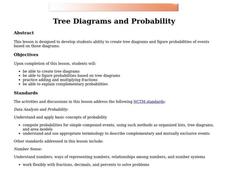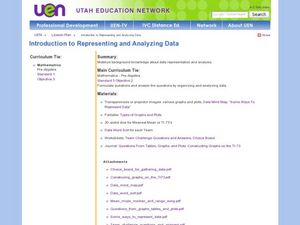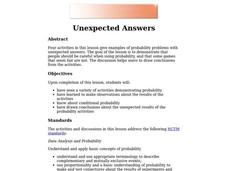Curated OER
Fast Facts
Ever use the inner circle/outer circle method of learning? Placing learners in a stationary inner circle and a rotating outer circle, they roll a die and attempt to be the first to call out an addition or multiplication equation with the...
Curated OER
Data and Probability- What's the Chance?
Young scholars investigate probability through a game. In this data lesson, students use dice and predictions to explore how probability works.
Shodor Education Foundation
Tree Diagrams and Probability
Aspiring statisticians create tree diagrams and figure probabilities of events based on those diagrams. They practice adding and multiplying fractions and explain complementary probabilities. Students use computers activities to make...
Pennsylvania Department of Education
Adding and Subtracting Rational Numbers to Solve Problems
Students explore the concept of probability. In this probability lesson, students use area to determine probability. Students use charts and spinners to help determine the probability of events such as flipping a coin or rolling a...
Curated OER
Probability
In this probability instructional activity, 6th graders solve and complete 3 different problems. First, they place the events on the probability scale shown. Then, students match the phrase to the best description of its chance of...
Curated OER
Is the Probability Probable?
Third graders compare experimental results with mathematical expectations of probabilities. They utilize a worksheet imbedded in this plan to gain practice with the concept of probability.
Curated OER
Probability Worksheet
In this probability worksheet, students record the outcomes of throwing a dice 20 times and tossing a coin 20 times. They fill in their data and answer 6 questions pertaining to their probability findings. Students can click on the Check...
Curated OER
Introduction to Representing and Analyzing Data
Represent data graphically. Allow your class to explore different methods of representing data. They create foldables, sing songs, and play a dice game to reinforce the measures of central tendency.
Curated OER
Exploring Probability
Fifth graders work in small groups of five or six to conduct a series of investigations. While recording the results using pencils on individual tally worksheets rotating to different stations and comparing results with the other...
Curated OER
Modeling Forest Fires Using Probability
Learners explore forestry. They discuss creating fire breaks to control forest fires. Students create models to determine the best way to manage forest fires. They discuss current techniques of forest management.
Shodor Education Foundation
Racing Game with One Die
Pupils roll a die to figure out which car advances on a race track. They determine the rules for each car moving forward and, given the statistics of the winner, compare if it matches their predictions.
Curated OER
What Are The Odds?
Students read the book, Jim Ugly, and discuss whether the odds were in favor of or against the character Jake finding his dad. They demonstrate an experiment involving odds by keeping a tally of how many times a colored die is pulled out...
Curated OER
Lara's Equiprobable Dice
Students try some new exercises involving probability. These are, first of all, that the probability of getting a given total when two dice are rolled is equal to the number of possible ways of getting that total, divided by 36 (the...
Curated OER
Richard's Dice
Young scholars problem solve logic problems. They complete a worksheet using dice as a manipulative. They decide on a problem solving strategy, solve the problem, and write up the solution.
Curated OER
Matching Pairs
Students examine the probability of the various findings in a game and determine the odds of winning. They differentiate between the facts of odds versus probability. Students use higher order thinking skills to explain how a problem is...
Curated OER
Make the Highest Total
Sixth graders predict the outcome of a simple probability experiment, test it and explain the result by using problem solving strategies to explore situations mathematically. They then play a few games informally where students play in...
Curated OER
Unexpected Answers
Students explore and complete a variety of activities demonstration probability. They make observations about the results of the activities. Students complete and discuss conditional probability. Also, students draw conclusions about...
Curated OER
Coin Tossing
Sixth graders examine the use of probability and compare it to actual real world results. In groups, they flip a coin a specific number of times while their other group members roll a set of dice the same amount of times as the coin. To...
Curated OER
"The Giver" by Lois Lowry
Students predict results, design a model, and carry out trials to determine probability based on their experimentation.
Curated OER
Rolling For Value
Young scholars participate in a lesson to comprehend the concept of probability while rolling dice. They recognize patterns while making observations and recording the data for each roll. Students also review place values while playing a...
Curated OER
Linear Equations
Eighth and ninth graders solve and graph 42 different problems that include writing various equations and graphing them on a grid. First, they create a table for each equation and graph it on a grid locating the x-and y-intercepts. Then,...
PBS
Remove One
With a set of 15 chips and a number line, learners predict what sums may occur with the rolling of two dice. When their sum comes up, they remove one of the chips from their number line with the objective of being the first to remove...
Curated OER
Lotto or Life: What Are the Chances?
Though the website does not seem to have the mentioned video, a reding and lottery style games simulate the chances of finding intelligent life somewhere other than Earth. Without the video, this lesson is short, but it can be a useful...

























